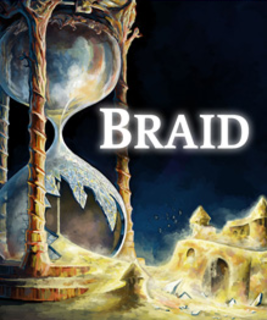Time for something different.
It all starts off innocuously enough in a lavishly hand-painted platform game, charming folk music playing as you bounce off the heads of monsters. It's so delightfully tranquil that you could be mistaken for playing a Super Mario Brothers clone designed by hippies. Then a misplaced jump leads to your demise and the startling truth of Braid becomes salient: time is firmly on your side, yours to control. Rewinding time to correct your actions, death becomes a mere inconvenience. It is here that the Mario similarities end as Braid creates situations that would be unfair, or downright impossible, without Tim's time-bending skills.
Time is woven into the very fabric of Braid, reflected in the story that gradually unravels. If we could rewind mistakes in our relationships, what would the repercussions be? The plot is a literal puzzle solved by collecting jigsaw pieces scattered around five worlds. Each world has its own unique time manipulation for Tim to use integral to the puzzle solving. At first, rewinding time is necessary to avoid being decapitated by a cannonball or killer bunny rabbit. Later on, rewinding can create a shadow doppelganger allowing for two actions to be performed at once. New concepts are introduced with excellent pacing as you progress, although the difficulty starts off as considerable and quickly reaches the stage where you will probably be tempted to scour the Internet in search of answers.
The most interesting world includes a clever pastiche of the arcade classic Donkey Kong. In the original, barrels roll down a slope and you have to jump over them to ascend. In Braid, time flows relative to your movement and the enemies move with it- forward as you walk right, backward as you walk left- forcing you to set aside years of video game playing experience and think about the task at hand in a completely different light.
So, is this a work of art? The enjoyment of playing and understanding Braid hinges on your familiarity with games. While anyone can appreciate the Mona Lisa or a Mozart concerto without prior knowledge, this isn't the case with Braid. Depending on how you look at it, this is either its greatest strength or weakness. Unlike the "games as art" movement's poster child Bioshock, which needed no prior knowledge to appreciate, many of Braid's puzzles succeed only because they prey on the player's established preconceptions. This is great if you can tell apart your Sonic from your Somari, but the intricate nuances of the puzzles may well be lost on neophytes.
Braid is imperfect by design. It is impossible to complete the game without solving every puzzle and these usually have a single solution- a situation that often leads to frustration. There are no clues and there is little incentive to play through a second time once you've finished. The denouement is an ultimately unsatisfying one, if preceded by a truly unforgettable final world. It is a real shame that only the most dedicated of players will be able to experience it. Rather than deride Braid for its failings, however, we should praise its uniqueness, intelligence and underlying charm, which elevate it beyond mere entertainment. A flawed masterpiece? Only time will tell.

